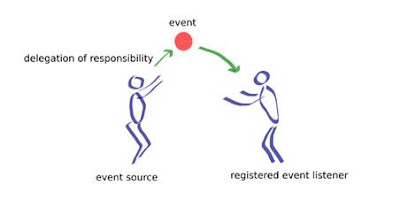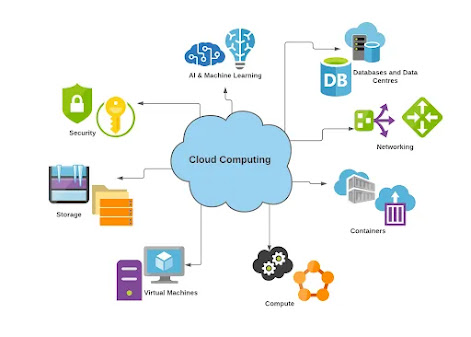Java Event Delegation Model, Listener and Adapter Classes
Java Event Delegation Model
The
Delegation Event model is one of the many techniques used to handle events in
GUI (Graphical User Interface) programming languages. GUI represents a system
where an user visually/graphically interacts with the system. Other interactive
systems are text based or called CUI (Character User Interface). CUI interacts
with the system by typing out commands in the console. GUI programming is
inherently event driven; that means, whenever an user initiates an activity
such as a mouse move that changes the co-ordinates of the mouse pointer in the
screen, or clicks a button, scrolls a page, and so forth, each is deemed as an
event that the GUI event handler maps the activity to a piece of code that
explains what response the application should provide to the user.
Any
program that uses GUI (graphical user interface) such as Java application
written for windows, is event driven. Event describes the change in state of
any object. For Example: Pressing a button, Entering a
character in Textbox, Clicking or Dragging a mouse, etc.
Components
of Event Handling
Event
handling has three main components,
·
Events: An
event is a change in state of an object.
·
Events Source: Event
source is an object that generates an event.
·
Listeners: A
listener is an object that listens to the event. A listener gets notified when
an event occurs.
Events,
Sources, and Listeners
The
delegation event model can be defined by three components: event, event source,
and event listeners.
·
Events: The event object defines the change in
state in the event source class. For example, interacting with the graphical
interfaces, such as clicking a button or entering text via keyboard in a text
box, item selection in a list, all represent some sort of change in the state.
The event object is used to carry the required information about the state
change. However, all events are not cause by user interaction. There are events
such as timer event, hardware/software events, and so forth, that does not
depend upon user interaction. They occur automatically. We can define the
procedure to handle them once they occur.
·
Event sources: Event sources are objects
that cause the events to occur due to some change in the property of the
component. Because there can be various types a component can trigger, each
must be registered to a listener to provide a suitable response.
·
Event listeners: Event listeners are
objects that are notified as soon as a specific event occurs. Event listeners
must define the methods to process the notification they are interested to
receive.
Figure: Events, sources, and listeners
How
Events are handled?
A
source generates an Event and sends it to one or more listeners registered with
the source. Once event is received by the listener, they process the event and
then return. Events are supported by a number of Java packages, like java.util, java.awt and java.awt.event.
Important
Event Classes and Interface
|
Event Classes
|
Description
|
Listener Interface
|
|
ActionEvent
|
generated when button is pressed, menu-item is selected,
list-item is double clicked
|
ActionListener
|
|
MouseEvent
|
generated when mouse is dragged, moved,clicked,pressed or
released and also when it enters or exit a component
|
MouseListener
|
|
KeyEvent
|
generated when input is received from keyboard
|
KeyListener
|
|
ItemEvent
|
generated when check-box or list item is clicked
|
ItemListener
|
|
TextEvent
|
generated when value of textarea or textfield is changed
|
TextListener
|
|
MouseWheelEvent
|
generated when mouse wheel is moved
|
MouseWheelListener
|
|
WindowEvent
|
generated when window is activated, deactivated, deiconified,
iconified, opened or closed
|
WindowListener
|
|
ComponentEvent
|
generated when component is hidden, moved, resized or set
visible
|
ComponentEventListener
|
|
ContainerEvent
|
generated when component is added or removed from container
|
ContainerListener
|
|
AdjustmentEvent
|
generated when scroll bar is manipulated
|
AdjustmentListener
|
|
FocusEvent
|
generated when component gains or loses keyboard focus
|
FocusListener
|
Steps
to handle events:
1. Implement
appropriate interface in the class.
2. Register
the component with the listener.
Example
of Event Handling
import java.awt.*;
import java.awt.event.*;
import java.applet.*;
import java.applet.*;
import
java.awt.event.*;
import java.awt.*;
/*
< applet
code="Test" width=300, height=100 >
*/
public class Test
extends Applet implements KeyListener
{
String msg="";
public void init()
{
addKeyListener(this);
}
public void keyPressed(KeyEvent k)
{
showStatus("KeyPressed");
}
public void keyReleased(KeyEvent k)
{
showStatus("KeyRealesed");
}
public void keyTyped(KeyEvent k)
{
msg = msg+k.getKeyChar();
repaint();
}
public void paint(Graphics g)
{
g.drawString(msg, 20, 40);
}
}
Listener
Interface
In the Java event hierarchy, we can find that some listener
interfaces depend on more than one event handler. Among them, only a few of the
event handling methods contain any meaningful code. Most are declared as an
empty body. These methods are supposed to be defined by their implementing
classes. Suppose we want to implement a mouse events; we either can implement
some/all of the mouse events by implementing listener interfaces or extend the
adapter class and define only the required events that we want to process.
public class
MouseHandler implements MouseListener, MouseMotionListener{
@Override
public void mouseDragged(MouseEvent e) {
// TODO Auto-generated method stub
}
@Override
public void mouseMoved(MouseEvent e) {
// TODO Auto-generated method stub
}
@Override
public void mouseClicked(MouseEvent e) {
statusLabel.setText(String
.format("Clicked at (x=%d,
y=%d)", e.getX(),
e.getY()));
}
@Override
public void mousePressed(MouseEvent e) {
// TODO Auto-generated method stub
}
@Override
public void mouseReleased(MouseEvent e) {
// TODO Auto-generated method stub
}
@Override
public void mouseEntered(MouseEvent e) {
statusLabel.setText("Mouse in
scope");
}
@Override
public void mouseExited(MouseEvent e) {
statusLabel.setText("Mouse out of
scope");
}
}
Adapter
Classes
Adapter classes implement the corresponding listener
interface. For example, the WindowAdapter class
implements WindowListener, which is a listener interface for
listening to window events such as closing, activated, opened, and so on,
events. Similarly, the MouseAdapter class implements MouseListener.
The event methods are all derived from the listener interfaces, but the
corresponding adapter classes do not provide any body of the event method.
These adapter classes are designated as abstract and are meant to be extended.
The class that extends defines one or more of the methods to contain the logic
of the event handling process. The adapter classes follow the Adapter pattern.
However, not all listeners have their corresponding adapter classes in the Java
API.
private class
MouseHandler extends MouseAdapter{
@Override
public void mouseClicked(MouseEvent e) {
statusLabel.setText(String
.format("Clicked at (x=%d,
y=%d)", e.getX(),
e.getY()));
}
@Override
public void mouseEntered(MouseEvent e) {
statusLabel.setText("Mouse in
scope");
}
@Override
public void mouseExited(MouseEvent e) {
statusLabel.setText("Mouse out of
scope");
}
}



Comments
Post a Comment